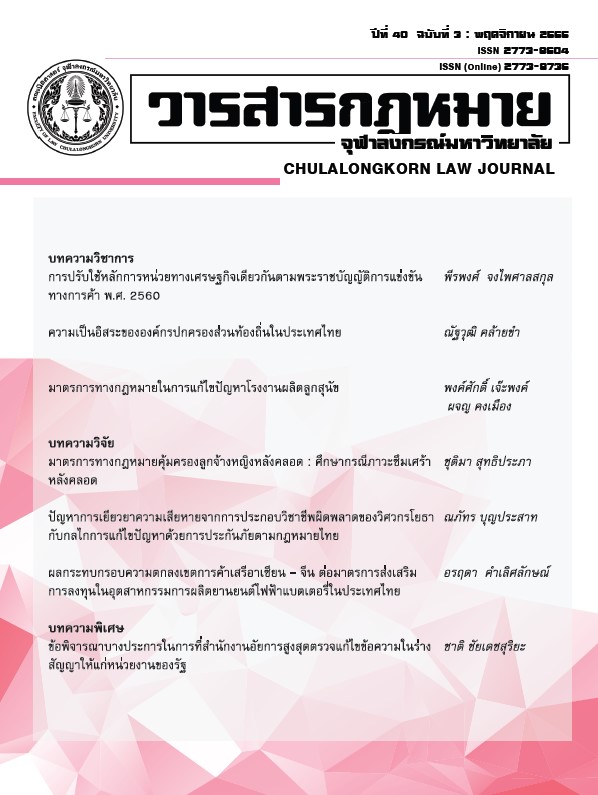ข้อพิจารณาบางประการในการที่สำนักงานอัยการสูงสุด ตรวจแก้ไขข้อความในร่างสัญญาให้แก่หน่วยงานของรัฐ
Main Article Content
บทคัดย่อ
การที่สำนักงานอัยการสูงสุดตรวจแก้ไขข้อความหรือถ้อยคำในร่างสัญญาที่หน่วยงานของรัฐส่งมาให้ตรวจพิจารณานั้น มีวัตถุประสงค์ คือเพื่อรักษาประโยชน์ของรัฐซึ่งเป็นไปตามหลักการที่บัญญัติไว้ในพระราชบัญญัติองค์กรอัยการและพนักงานอัยการ พ.ศ. 2553 มาตรา 23 ซึ่งการรักษาประโยชน์ของรัฐมีความหมายครอบคลุมทั้งการรักษาประโยชน์ของหน่วยงานของรัฐที่จะทำสัญญา ประโยชน์ของทางราชการ และประโยชน์ของสาธารณะ
หลักการหรือแนวทางสำคัญในการที่สำนักงานอัยการสูงสุดตรวจแก้ไขข้อความหรือถ้อยคำในร่างสัญญาที่หน่วยงานของรัฐส่งมาให้ตรวจพิจารณา มีอยู่ 3 ประการ กล่าวคือ
ประการที่ 1 การตรวจแก้ไขข้อความหรือถ้อยคำในร่างสัญญาของหน่วยงานของรัฐ เพื่อให้มีรายการสำคัญถูกต้องครบถ้วนตามประเด็นที่พึงมีตามกฎหมายและตรงตามเจตนารมณ์ในการทำสัญญาตามข้อเท็จจริงที่ได้ความจากหน่วยงานของรัฐที่จะทำสัญญานั้น
ประการที่ 2 การตรวจแก้ไขข้อความหรือถ้อยคำในร่างสัญญาของหน่วยงานของรัฐ เพื่อให้รายละเอียดในร่างสัญญานั้นเป็นไปโดยสอดคล้องกับหลักการทางกฎหมาย โดยที่หน่วยงานของรัฐได้รับสิทธิประโยชน์อันพึงมีพึงได้โดยชอบตามกฎหมาย โดยไม่เสียเปรียบหรือเสียประโยชน์ รวมทั้งเพื่อเป็นการรักษาประโยชน์ของรัฐอันรวมถึงทั้งประโยชน์ของทางราชการและประโยชน์สาธารณะให้เหมาะสมยิ่งขึ้น และในขณะเดียวกันก็จะต้องมีความเป็นธรรมแก่คู่สัญญาทุกฝ่ายด้วย
ประการที่ 3 การตรวจแก้ไขข้อความหรือถ้อยคำในร่างสัญญาของหน่วยงานของรัฐ เพื่อให้ร่างสัญญามีความเป็นระเบียบ ถูกต้อง ชัดเจน และรัดกุมทางภาษา โดยป้องกันและแก้ไขช่องโหว่หรือความเคลือบคลุมของร่างสัญญาที่อาจทำให้เกิดปัญหาการตีความสัญญาเป็นหลายทางซึ่งอาจก่อให้เกิดข้อโต้แย้งหรือข้อพิพาทระหว่างคู่สัญญาได้ในภายหลัง ทั้งนี้ เพื่อจะได้เป็นแบบสัญญาที่ดี และเป็นประโยชน์ต่อการที่หน่วยงานของรัฐผู้ทำสัญญานั้นจะบริหารสัญญาได้อย่างมีประสิทธิภาพสมตามวัตถุประสงค์ของการทำสัญญานั้นต่อไป
บทความนี้มุ่งหมายจะกล่าวถึงตัวอย่างในทางปฏิบัติในการตรวจแก้ไขข้อความหรือถ้อยคำในร่างสัญญาของหน่วยงานของรัฐตามหลักการดังกล่าวข้างต้น
Article Details

อนุญาตภายใต้เงื่อนไข Creative Commons Attribution-NonCommercial-NoDerivatives 4.0 International License.
ลิขสิทธิ์และเนื้อหาในเว็บไซต์ของวารสารกฎหมาย (รวมถึง โดยไม่จำกัดเฉพาะ เนื้อหา รหัสคอมพิวเตอร์ งานศิลป์ ภาพถ่าย รูปภาพ ดนตรีกรรม โสตทัศนวัสดุ) เป็นกรรมสิทธิ์ของวารสารกฎหมาย และผู้ได้รับการโอนสิทธิทุกราย
1. วารสารกฎหมาย ให้อนุญาตให้คุณใช้สิทธิอันไม่เฉพาะเจาะจงที่สามารถถูกถอนเมื่อใดก็ได้ โดยไม่มีค่าใช้จ่าย ในการ
- เยี่ยมชมเว็บไซต์และเอกสารในเว็บไซต์นี้ จากคอมพิวเตอร์หรือเครื่องมือสื่อสารผ่านเว็บบราวเซอร์
- คัดลอกและจัดเก็บเว็บไซต์และเอกสารในเว็บไซต์นี้บนลงคอมพิวเตอร์ของคุณผ่านระบบความจำ cache
- สั่งพิมพ์เอกสารจากเว็บไซต์นี้สำหรับการใช้ส่วนตัวของคุณ
- ผลงานที่ได้รับการตีพิมพ์โดยวารสารกฎหมาย จุฬาลงกรณ์มหาวิทยาลัย ถูกคุ้มครองภายใต้ Creative Commons Attribution 4.0 International License ซึ่งอนุญาตให้ทุกคนสามารถคัดลอก แจกจ่าย ดัดแปลง ส่งต่อ ผลงานได้ ก็ต่อเมื่อผลงานและแหล่งข้อมูลได้รับการอ้างอิงอย่างเหมาะสม
2. วารสารกฎหมาย จุฬาลงกรณ์มหาวิทยาลัย สงวนสิทธิ์ไม่อนุญาตให้คุณใช้สิทธิอื่นใดที่เกี่ยวข้องกับเว็บไซต์และเอกสารบนเว็บไซต์นี้ เช่น การคัดลอก ดัดแปลง เปลี่ยนแปลง ส่งต่อ ตีพิมพ์ แจกจ่าย เผยแพร่ จัดแสดงในที่สาธารณะ ไม่ว่าจะในรูปแบบใดก็ตาม ซึ่งเว็บไซต์หรือเอกสารบนเว็บไซต์ โดยไม่อ้างอิงถึงแหล่งข้อมูลหรือโดยไม่ได้รับอนุญาตเป็นลายลักษณ์อักษรจากวารสารกฎหมาย จุฬาลงกรณ์มหาวิทยาลัย
3. คุณอาจขออนุญาตที่จะใช้เอกสารอันมีลิขสิทธิ์บนเว็บไซต์นี้โดยการเขียนอีเมลล์มายัง journal@law.chula.ac.th
4. วารสารกฎหมาย จุฬาลงกรณ์มหาวิทยาลัย เข้มงวดกับการคุ้มครองลิขสิทธิ์อย่างมาก หากวารสารกฎหมาย จุฬาลงกรณ์มหาวิทยาลัยพบว่าคุณได้ใช้เอกสารอันมีลิขสิทธิ์บนเว็บไซต์นี้โดยไม่ถูกต้องตามการอนุญาตให้ใช้สิทธิ ดังที่กล่าวไปข้างต้น วารสารกฎหมาย จุฬาลงกรณ์มหาวิทยาลัยอาจดำเนินคดีตามกฎหมายต่อคุณได้ เพื่อเรียกร้องค่าเสียหายที่เป็นตัวเงินและคำขอชั่วคราวให้คุณหยุดการใช้เอกสารดังกล่าว ทั้งนี้ คุณอาจถูกสั่งให้ชดใช้ค่าใช้จ่ายใดๆ ที่เกี่ยวข้องกับการดำเนินการตามกฎหมายนี้
หากคุณพบเห็นการใช้เอกสารอันมีลิขสิทธิ์ของวารสารกฎหมาย จุฬาลงกรณ์มหาวิทยาลัย ที่ขัดหรืออาจขัดต่อการอนุญาตให้ใช้สิทธิดังที่ได้กล่าวไปข้างต้น โดยเชื่อว่าได้ละเมิดลิขสิทธิ์ของคุณหรือของผู้อื่น สามารถร้องเรียนมาได้ที่ journal@law.chula.ac.th


